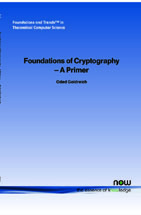Foundations of Cryptography – A Primer
By Oded Goldreich, Department of Computer Science, Weizmann Institute of Science, Israel
Abstract
Revolutionary developments which took place in the 1980's have transformed cryptography from a semi-scientific discipline to a respectable field in theoretical Computer Science. In particular, concepts such as computational indistinguishability, pseudorandomness and zero-knowledge interactive proofs were introduced and classical notions as secure encryption and unforgeable signatures were placed on sound grounds. The resulting field of cryptography, reviewed in this survey, is strongly linked to complexity theory (in contrast to "classical" cryptography which is strongly related to information theory).
Foundations of Cryptography
Foundations of Cryptography surveys the main paradigms, approaches and techniques used to conceptualize, define and provide solutions to natural cryptographic problems. The author starts by presenting some of the central tools; that is, computational difficulty (in the form of one-way functions), pseudorandomness, and zero-knowledge proofs. Based on these tools, the emphasis is shifted to the treatment of basic applications such as encryption and signature schemes as well as the design of general secure cryptographic protocols. The author has created a unique overview that includes well over 100 references. The accent is on the clarification of fundamental concepts and on demonstrating the feasibility of solving several central cryptographic problems. Foundations of Cryptography is an invaluable resource for all students, researchers and practitioners interested in the foundations that underpin modern cryptography.
